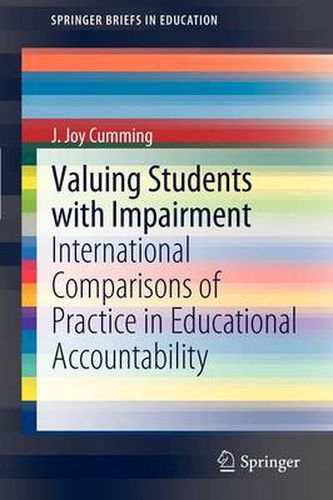Readings Newsletter
Become a Readings Member to make your shopping experience even easier.
Sign in or sign up for free!
You’re not far away from qualifying for FREE standard shipping within Australia
You’ve qualified for FREE standard shipping within Australia
The cart is loading…






This title is printed to order. This book may have been self-published. If so, we cannot guarantee the quality of the content. In the main most books will have gone through the editing process however some may not. We therefore suggest that you be aware of this before ordering this book. If in doubt check either the author or publisher’s details as we are unable to accept any returns unless they are faulty. Please contact us if you have any questions.
In this book, the author Joy Cumming draws on knowledge of law, assessment and measurement to provide an original analysis of the inclusion of students with impairment in educational accountability assessments in the U.S., England and Australia. Equitable education of students with impairment is worldwide policy. Educational accountability for improvement of educational outcomes is also a worldwide phenomenon. The U.S., England and Australia are well placed economically and politically to pursue best educational practice for students with impairment and well advanced in both provision and educational accountability systems. Examining these three systems enables an analysis of possible optimal practices to guide other countries. The book identifies three models of impairment in place in legislation, policy and enacted practice for educational accountability with students with impairment. Intentions of legislation and policy reflect a social model of impairment-while an individual has an impairment, social practice creates the barrier that leads to a disability. In implementation, legislation and policy rely on a medical model of disability-categorizing disability in medical or specialist terms. In educational accountability practices, it is argued in this book, a third model of disability is created-a psychometric model, with impairment constructed through overemphasis on standardization of assessment processes. Eight explicit and implicit assumptions that underpin the ways students with impairment are valued in educational accountability are identified and discussed. Three recommendations are made to promote equitable inclusive educational accountability practices for students with impairment, to inform future policy and practice in all countries.
$9.00 standard shipping within Australia
FREE standard shipping within Australia for orders over $100.00
Express & International shipping calculated at checkout
This title is printed to order. This book may have been self-published. If so, we cannot guarantee the quality of the content. In the main most books will have gone through the editing process however some may not. We therefore suggest that you be aware of this before ordering this book. If in doubt check either the author or publisher’s details as we are unable to accept any returns unless they are faulty. Please contact us if you have any questions.
In this book, the author Joy Cumming draws on knowledge of law, assessment and measurement to provide an original analysis of the inclusion of students with impairment in educational accountability assessments in the U.S., England and Australia. Equitable education of students with impairment is worldwide policy. Educational accountability for improvement of educational outcomes is also a worldwide phenomenon. The U.S., England and Australia are well placed economically and politically to pursue best educational practice for students with impairment and well advanced in both provision and educational accountability systems. Examining these three systems enables an analysis of possible optimal practices to guide other countries. The book identifies three models of impairment in place in legislation, policy and enacted practice for educational accountability with students with impairment. Intentions of legislation and policy reflect a social model of impairment-while an individual has an impairment, social practice creates the barrier that leads to a disability. In implementation, legislation and policy rely on a medical model of disability-categorizing disability in medical or specialist terms. In educational accountability practices, it is argued in this book, a third model of disability is created-a psychometric model, with impairment constructed through overemphasis on standardization of assessment processes. Eight explicit and implicit assumptions that underpin the ways students with impairment are valued in educational accountability are identified and discussed. Three recommendations are made to promote equitable inclusive educational accountability practices for students with impairment, to inform future policy and practice in all countries.